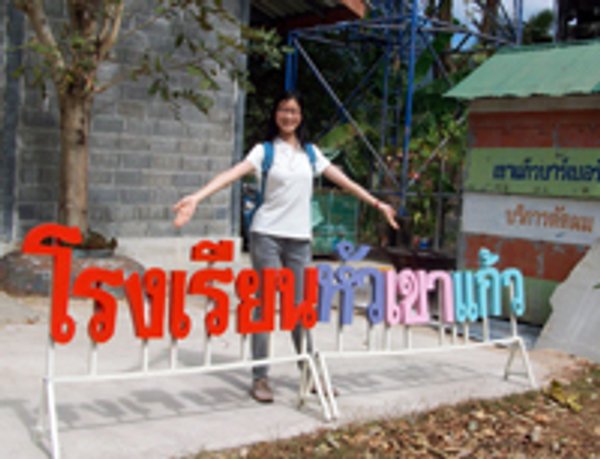Last December 10, nine young women landed at Suvarnabhumi International Airport, Bangkok from Singapore, ready for a service project in Nakhon Nayok, some two hours’ drive from the capital. We had been working on the project for the last 6 months, but the catastrophic floods in Bangkok which turned life upside down in October and November caused us considerable anxiety as to whether the plans would push through. Fortunately, they did though we were decided to go in any event. Although the connecting highway between Bangkok and Nakhon Nayok was damaged, precisely the province we had planned on visiting was spared.
The project lasted a brief 7 days in which we taught English to children in Hua Khao Kaeo School in rural Thailand. Many of them came from low-income families and as the school had no teachers dedicated especially to teaching English, students rarely got the chance to hear English spoken. Ferninda P., a fourth-year student at the National University of Singapore, shares her thoughts about the project.
* * *

I have traveled to Thailand at least twice, but this was my first as a volunteer in a service project. In fact, it was my first service project and I was really looking forward to it.
Whenever people volunteer for a service project, they ask themselves, “What can we do for them?” Our plan was to build up the children’s confidence in speaking English. They have a few hours a week of English in school, but the dynamic Principal of the rural school was keen to try to stand her wards in better stead so that they can aim for better jobs later. We struggled through some basic points; often we could see that they were making a real effort to recall words they had learnt… However, in the end, I learnt that it was they who taught me a lot more - about life.

On the first day, we tried to ease in the lessons through song and dance. We also played some word games with the kids. They learned to sing “Train of Love” while walking around in a circle. We were falling all over each other because sometimes the kids confused the commands, jumping forward instead of backward, and vice versa! Laughter filled the schoolyard while kids and volunteers had immense fun.
To make it easier for the kids to remember us, we wore name tags in Thai characters. They called us ‘Phii’, followed by our name. ‘Phii’ means ‘the elder one’, like ‘jie jie’ or ‘kor kor’ (in Chinese) or ‘kakak’ (in Malay). As you can imagine, I was tagged Phii Ninda or P’Ninda.

Interestingly, after some games, they remembered our names easily and they cheerfully held our hands and jabbered away at us in Thai even though we didn’t understand them!
The following days over lunch break, P’Sara and P’Elvina, who had volunteered for the kindergarten classes, were constantly trailed by a bunch of kindergarten kids who wanted to be hugged, to sit on their laps, or who were contented to follow them as if they were the Pied Piper!

And every time the boys saw P’Sofia, who is Spanish, they would energetically shout, “Barcelona! Barcelona!”, even though Sofia is actually a fan of Real Madrid football club!
At university, I have known of lots of volunteer expedition projects which involve building wells and painting homes, usually over weeks. We are always challenged to build something that is ‘sustainable’.
Some people might therefore ask, “You went for a service project for just a week? What can you do in a week?”

Well, the kids might forget the vocabulary that we taught in that one week, but I am convinced that their experience and the memory that someone out there cares for them is worth their weight in gold.
As for us volunteers, it is their kindness and cheerfulness that will always remain. I was moved by their generous smiles and affection, by their desire to express their gratefulness with beautifully drawn thank-you cards, with the gifts of candies in hand-drawn wrapping paper…
It was hard to leave. Harder yet because they had managed to ask in English, “You… back... again?” Are you coming back again? I would love to go back. It has been an experience I will not forget.
Ferninda P.
